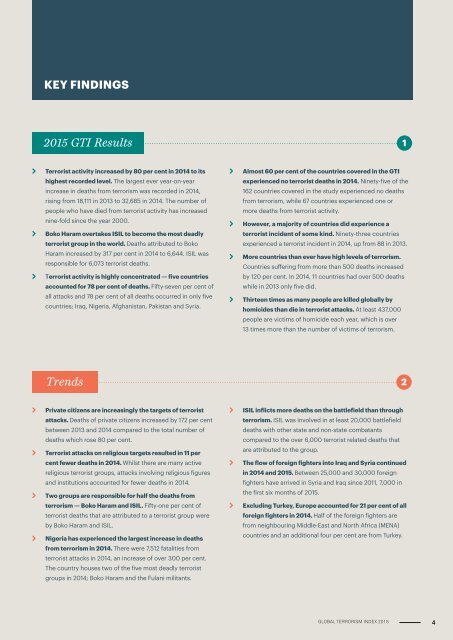MEASURING AND UNDERSTANDING THE IMPACT OF TERRORISM
2015 Global Terrorism Index Report_0_0
2015 Global Terrorism Index Report_0_0
Create successful ePaper yourself
Turn your PDF publications into a flip-book with our unique Google optimized e-Paper software.
KEY FINDINGS<br />
2015 GTI Results<br />
Terrorist activity increased by 80 per cent in 2014 to its<br />
highest recorded level. The largest ever year-on-year<br />
increase in deaths from terrorism was recorded in 2014,<br />
rising from 18,111 in 2013 to 32,685 in 2014. The number of<br />
people who have died from terrorist activity has increased<br />
nine-fold since the year 2000.<br />
Boko Haram overtakes ISIL to become the most deadly<br />
terrorist group in the world. Deaths attributed to Boko<br />
Haram increased by 317 per cent in 2014 to 6,644. ISIL was<br />
responsible for 6,073 terrorist deaths.<br />
Terrorist activity is highly concentrated — five countries<br />
accounted for 78 per cent of deaths. Fifty-seven per cent of<br />
all attacks and 78 per cent of all deaths occurred in only five<br />
countries; Iraq, Nigeria, Afghanistan, Pakistan and Syria.<br />
Almost 60 per cent of the countries covered in the GTI<br />
experienced no terrorist deaths in 2014. Ninety-five of the<br />
162 countries covered in the study experienced no deaths<br />
from terrorism, while 67 countries experienced one or<br />
more deaths from terrorist activity.<br />
However, a majority of countries did experience a<br />
terrorist incident of some kind. Ninety-three countries<br />
experienced a terrorist incident in 2014, up from 88 in 2013.<br />
More countries than ever have high levels of terrorism.<br />
Countries suffering from more than 500 deaths increased<br />
by 120 per cent. In 2014, 11 countries had over 500 deaths<br />
while in 2013 only five did.<br />
Thirteen times as many people are killed globally by<br />
homicides than die in terrorist attacks. At least 437,000<br />
people are victims of homicide each year, which is over<br />
13 times more than the number of victims of terrorism.<br />
Trends 2<br />
Private citizens are increasingly the targets of terrorist<br />
attacks. Deaths of private citizens increased by 172 per cent<br />
between 2013 and 2014 compared to the total number of<br />
deaths which rose 80 per cent.<br />
Terrorist attacks on religious targets resulted in 11 per<br />
cent fewer deaths in 2014. Whilst there are many active<br />
religious terrorist groups, attacks involving religious figures<br />
and institutions accounted for fewer deaths in 2014.<br />
Two groups are responsible for half the deaths from<br />
terrorism — Boko Haram and ISIL. Fifty-one per cent of<br />
terrorist deaths that are attributed to a terrorist group were<br />
by Boko Haram and ISIL.<br />
Nigeria has experienced the largest increase in deaths<br />
from terrorism in 2014. There were 7,512 fatalities from<br />
terrorist attacks in 2014, an increase of over 300 per cent.<br />
The country houses two of the five most deadly terrorist<br />
groups in 2014; Boko Haram and the Fulani militants.<br />
ISIL inflicts more deaths on the battlefield than through<br />
terrorism. ISIL was involved in at least 20,000 battlefield<br />
deaths with other state and non-state combatants<br />
compared to the over 6,000 terrorist related deaths that<br />
are attributed to the group.<br />
The flow of foreign fighters into Iraq and Syria continued<br />
in 2014 and 2015. Between 25,000 and 30,000 foreign<br />
fighters have arrived in Syria and Iraq since 2011, 7,000 in<br />
the first six months of 2015.<br />
Excluding Turkey, Europe accounted for 21 per cent of all<br />
foreign fighters in 2014. Half of the foreign fighters are<br />
from neighbouring Middle-East and North Africa (MENA)<br />
countries and an additional four per cent are from Turkey.<br />
GLOBAL <strong>TERRORISM</strong> INDEX 2015<br />
4


